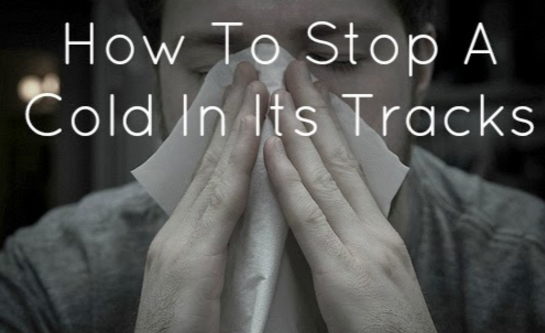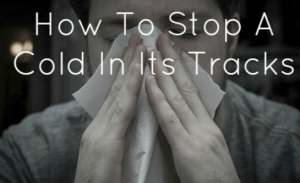
 One day you’re fine. The next you have a scratchy throat, watery eyes, and a runny nose. There’s a tickle in the back of your throat, and your normal high energy is nowhere to be found.
One day you’re fine. The next you have a scratchy throat, watery eyes, and a runny nose. There’s a tickle in the back of your throat, and your normal high energy is nowhere to be found.
Yes, these are early signs that you’re coming down with something. But don’t grab your tissue box and hop into bed just yet — there are ways to nip that cold in the bud.
How to stop a cold before it starts
The germs that cause colds have a preferred route of travel: from your hands to your nose or eyes, and then to the nasopharynx — where the nose meets the mouth at the back of the throat (and where most colds begin). Unlike the flu, which tends to travel through the air, cold viruses prefer a physical transmission. Studies have shown that most cold viruses can survive for up to three hours on nonporous surfaces such as doorknobs, counter tops, and coffee cups. They can also survive on people’s hands for several hours if they don’t wash them.
That’s why hand washing — after you shake hands, after you open a door, after you push a shopping cart — is item number one in your anti-cold defense. If you kill cold germs on your hands before you transfer them to your nose or eyes, you stop a cold before it can start.
Cold fighting tips:
- Avoid touching your face, especially your eyes and nose.
- The common cold needs to reach the mucous membrane lining the nose or into the tear ducts in order to cause infection. That means touching your face — specifically your nose and eyes — is the primary way people give themselves cold germs.
- Try not to touch public surfaces.
- The virus can be passed to others via shared surfaces such as doorknobs, chair backs, books, and toys.
- Did you know you’re more likely to catch a cold from touching a sick person’s water glass and then wiping your eye than you are from drinking a sip of the sick person’s water?
- Get lots of sleep.
- People who slept fewer than seven hours a night were three times more likely to develop a cold when exposed to a rhinovirus compared to those who slept eight or more hours a night.
How to get over a cold fast
Even when you try your hardest, you might still get an occasional cold. Fortunately, most colds begin to fade on their own after about a week, but sometimes it takes two weeks before you feel better. If more than two weeks has passed and you’re still coughing, it may be that tissues in the lungs have become irritated. These “rhinovirus-induced changes” can last up to four weeks.
Tips for getting better:
- Go to bed.
- Drink a lot of water.
- Cheer up with chicken soup.
- Gargle a sore throat.
- “Irrigate” your nose with saline.
- Moisten the air with a humidifier.
- Don’t overuse over-the-counter cold remedies.
If you can’t seem to kick the cold head down to your local Coastal Urgent Care of Louisiana today!
